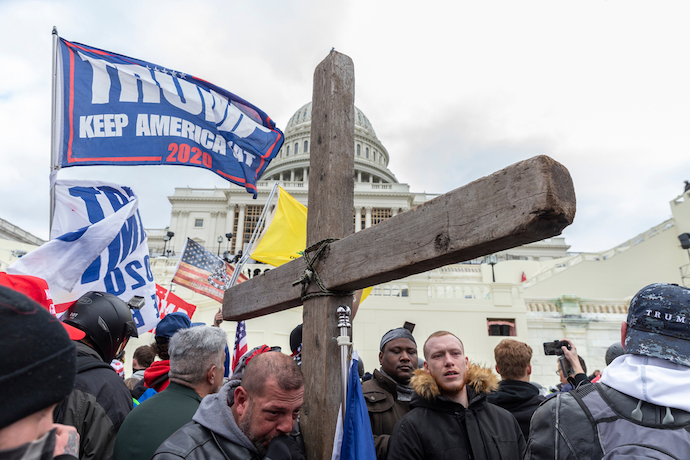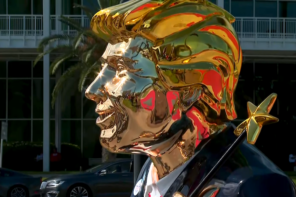A month ago, I argued here on RD that America’s national conversation about Christianity is “fundamentally unserious.” Not because, as conservative Christian commentator Bonnie Kristian would have it, Democrats find it offensive when an elected Republican like Rep. Madison Cawthorn brags about converting Muslims and Jews. (In my view, proselytizing is always objectification, and it should offend the sensibilities of those who embrace pluralism.) No, our conversation about Christianity is unserious precisely because it tends to start from a place of unacknowledged Christian privilege, thus setting readers up to sympathize with someone like Cawthorn while making it that much harder to consider the perspective of his targets for conversion, who are ipso facto being othered.
I’ve long lamented the general state of American religion journalism, which tends to whitewash evangelical authoritarianism, thereby enabling it. And in the aftermath of last Wednesday’s insurrection, in which the Christian flag and the Confederate battle flag were both among the symbols displayed by terrorists occupying the Capitol, some of the first prominent commentaries on the Christian nationalist character of the rioting continued in that pattern. They essentially painted the Christian terrorists as fringe—they are not—and pinned the blame for their actions solely on Donald Trump while allowing prominent white evangelical leaders to go unchallenged in distancing themselves from the events they had very much laid the groundwork for.
Journalists & editors: When you uncritically offer Trump supporters like Al Mohler, Franklin Graham, and others the opportunity to denounce the insurrection (while maintaining their loyalty to the figure and party that talked it into reality) you're just doing PR work for them.
— Religion Dispatches (@RDispatches) January 8, 2021
For example, NPR framed their coverage with the headline “Faith Leaders Nearly Unanimous in Condemning Assault on Capitol.” Instead of giving visible evangelical leaders the plausible deniability they crave, we ought to be asking how they fostered the fascism in the pews. We should be likewise demanding accountability from the many Republican leaders now self-servingly distancing themselves from Donald Trump. These include Senate Majority Leader Mitch McConnell, who no honest observer could paint as genuinely concerned with democracy as opposed to keeping up appearances as he helps his party hoard power gained through anti-democratic means, defying the will of the majority of Americans.
Thankfully, some of the reporting and commentary that’s emerged since is more intellectually honest, giving me some hope that perhaps, at long last, the Trump years will force a reckoning with the ways in which conservative Christianity upholds white supremacist patriarchy in the United States. Not as a fig leaf, not as window dressing, but substantively, as religion. Christianity comes in many varieties, not all of which are benign, pro-social, or conducive to the embrace of pluralism and democracy among their adherents.
Leading the charge to enable right-wing evangelical leaders in their efforts to distance themselves from the president they’d championed through years of repugnant, anti-democratic behavior was The Atlantic’s Emma O. Green. She makes a point of letting readers know that the organizers behind the recent “Jericho March” campaign, whose participants overlapped with last Wednesday’s rioters, are “essentially unknown,” as if that fact alone is decisive with respect to a systemic problem in white evangelical subculture. Never mind that the emcee of the Jericho March’s main event, evangelical author and radio host Eric Metaxas, is a very well-known figure in the conservative Christian world, and well connected enough to attend Donald Trump’s final speech at last year’s Republican National Convention (after which he sucker punched an anti-Trump protester).
Green also frames her analysis of the insurrection in terms of “evidence that Donald Trump has bent elements of Christianity to his will, and that many Christians have obligingly remade their faith in his image,” which puts things precisely backwards. Trump is a symptom of a virulent social disease for which the Christian Right is patient zero. I’ve been arguing that the embrace of a grievance-driven strongman like Trump flows logically from the authoritarian, alternative-facts-craving nature of evangelical theology and subculture since early 2016, and the four nightmarish years of Trump’s term in office have only substantiated my contention.
No previous administration, not even George W. Bush’s, did as much to push through the Christian Right’s culture wars agenda on social policy, or gave hardline evangelicals such exclusive access to the president as that enjoyed by Pat Robertson’s Christian Broadcasting Network and Trump’s Evangelical Advisory Board. Only Trump proved willing to take the ill-advised and destabilizing foreign policy step of moving the US Embassy in Israel from Tel Aviv to Jerusalem because of evangelicals’ extreme beliefs about “biblical prophecy.”
To be sure, some prominent evangelical leaders like R. Albert Mohler, president of the Southern Baptist Theological Seminary, have engaged in handwringing about the matter of Trump’s “character,” although others, like First Baptist – Dallas Pastor Robert Jeffress and President of the Billy Graham Evangelistic Association Franklin Graham, have been consistent in their pro-Trump enthusiasm. Green’s reporting gives pride of place to Mohler’s insistence that he was “shocked” at last Wednesday’s events and that, in supporting Trump in the 2020 election, he had no inkling that things would take the turn that they have. This only serves to reinforce the false notion that Trump is a cause rather than a symptom of evangelical illiberalism.
In addition, Green fails to discuss Mohler’s key role in the recent release of a joint statement from all six Southern Baptist seminaries that condemns Critical Race Theory and intersectionality as incompatible with Christian beliefs as defined by Southern Baptist theology. This evident racism presumably reflects an ethos in America’s largest Protestant denomination that might have just a little to do with the prevalence of Christian rhetoric, prayer, and symbolism on display in the white supremacist invasion of the Capitol. And it’s rich for someone who just rejected anti-racist scholarship as unbiblical to pretend that “official” Southern Baptist Christianity has no connection to racism among America’s white Christians, though of course Mohler would deny that either he or Southern Baptist theology is racist.
Reflecting a trend that began roughly in early 2018, when discussion of the concept of Christian nationalism as defined by sociologists Andrew Whitehead, Samuel L. Perry, and their colleagues emerged in The Washington Post, some coverage of last Wednesday’s events takes a more responsible approach than the Atlantic. For example in the New York Times, Elizabeth Dias and Ruth Graham framed their story with a description of members of the white supremacist group the Proud Boys offering up a clearly evangelical prayer before rioting. They didn’t shy away from quoting churchgoing, Bible-believing white Christians on their motivations for attending, nor from explicitly describing their conspiratorial beliefs about the election and the supposed “anti-Christian” plans of President-Elect Joe Biden, a devout Catholic, as false.
Meanwhile, USA Today’s reporting by Rick Jervis, Marc Ramirez, and Romina Ruiz-Goiriena focused on evangelical leaders Jeffress and Graham proclaiming that they have no regrets over their Trump support, and that they don’t expect Trump to lose evangelical backing because of the violence. To be sure, they say they condemn the insurrection itself, but they attempt to normalize evangelical Trump support by deflecting blame from the inciter-in-chief.
Their comments recall the aftermath of the white supremacist violence at the 2017 “Unite the Right” rally in Charlottesville, Virginia, when Jeffress appeared on CBN asserting that “there is not a racist bone” in Trump’s body. Presenting Jeffress’s and Graham’s latest remarks in context makes their nakedly self-serving nature obvious, and Jervis, Ramirez, and Ruiz-Goiriena did even better by citing keen observer of the Christian Right Sarah Posner, author of Unholy: Why Evangelicals Worship at the Altar of Donald Trump, on how evangelicals will minimize “Trump’s role in the Capitol attack… because many see him not just as an elected official but one anointed by God.”
Looking to critical observers for comment when covering conservative, mostly white evangelicalism should be axiomatic, Journalism 101 stuff. Ideally, members of groups directly harmed by the Christian Right’s politics and ex-evangelical voices should also be included (full disclosure: I am an ex-evangelical). Under conditions of Christian hegemony in the United States, however, that has not been the prevailing practice—not by a long shot.
If social media buzz is any indicator, there’s still a widespread tendency for liberals to dismiss Christian nationalists as “fake Christians”—a deflection that only serves to reinforce Christian supremacism by equating “Christian” with “good,” thus harming the non-religious and adherents of minority religions. In fact, frequent church attendance among white Christians is an indicator of higher Trump support.
Still, the fact that books like Posner’s—along with Whitehead and Perry’s Taking America Back for God: Christian Nationalism in the United States, Public Religion Research Institute CEO Robert P. Jones’ White Too Long: The Legacy of White Supremacism in American Christianity, and Kristin Kobes Du Mez’s Jesus and John Wayne: How White Evangelicals Corrupted a Faith and Fractured a Nation—are increasingly shaping discussion of evangelicalism in print media is reason to hope that our elite public sphere is at last lurching toward a genuine reckoning with white evangelical authoritarianism. And that is cause for some hope, because without squarely and honestly facing the role of white Christianity in fostering American society’s worst impulses, there’s no way to heal and move forward.
Is America, then, at last ready for a serious conversation about the Christian Right? I’d say the answer is a definite maybe.





